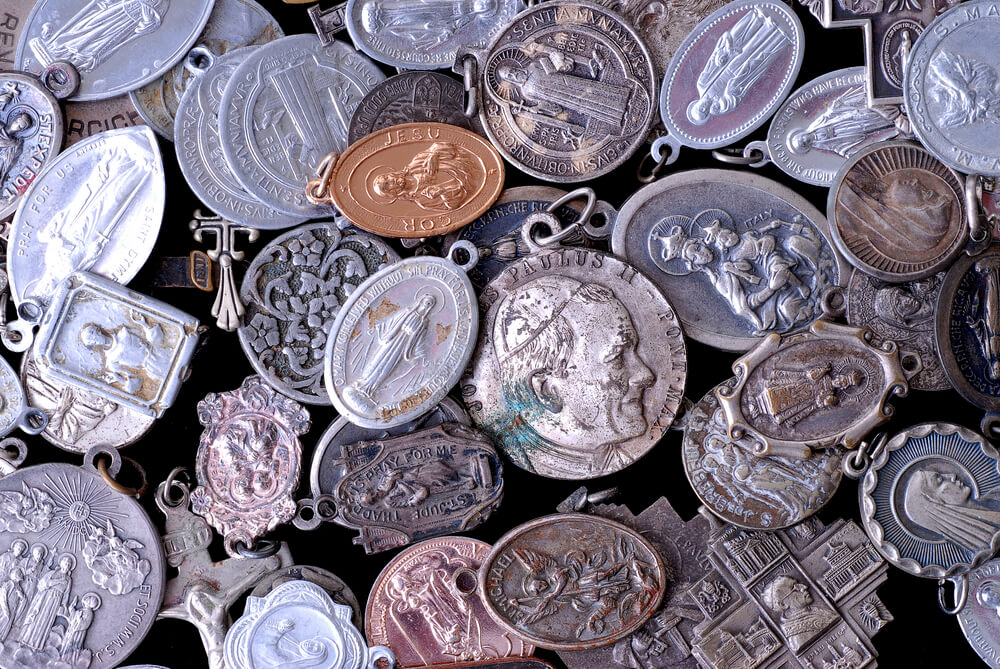Within the Catholic Church, there are many external items of devotion and piety that are used to draw us closer to the Lord. Rosaries, sacred images, prayer cards, saint medals, and candles are ‘sacramentals’ that are common items in many Catholic homes and parishes. Maybe you have some of these items in your own home and have even had them blessed by a priest.
But what happens when you no longer have use for a religious object? Your palm from Palm Sunday is all dried out, but it was blessed during the Palm Sunday Mass. You realize you have 95 rosaries, but you really don’t need more than five. Or your rosary has broken but you can’t just throw it away, so you have a drawer filled with broken beads.
A listener recently called-in to The Patrick Madrid Show to ask how one should properly dispose of blessed and other religious items. Patrick first suggested, if the pastor permits it, to have a box marked ‘Free’ in the vestibule of the church where parishioners could put religious articles that are no longer needed but may bless someone else.
“Families with children often like to have those things,” Patrick pointed out. “And because free is good that would be, I think, an easy way to dispose of them in a way that keeps them significant in the lives of others.”
But if sharing your religious items with others isn’t an option (like you don’t want to pass along your dried-out palm leaves) Patrick also found a more systematic explanation from the Diocese of Superior in Wisconsin of how to dispose of religious items.
The Diocese of Superior notes, “Once a religious object is blessed and dedicated for divine worship or veneration, it must be treated with reverence and must not be used in either an improper or profane way.” (cf. Code of Canon Law, #1171)
That means throwing a blessed item in the trash is not a reverent way to dispose of it. But the Church does provide guidance for their proper disposal.
“The basic rule for the disposition of these items is to burn or to bury them,” states the Diocese of Superior. “Therefore, the normal ‘rule of thumb’ is that anything that has been blessed should be burned (and then the ashes buried) or simply buried.”
If you’re reading this and anxious about the palms, rosaries, and prayer cards you’ve thrown away over the years, there’s no need to lose sleep over it.
The Diocese of Superior explains, “It is not a sin to throw away blessed items, but out of proper respect, one should dispose of them in this way. If devotionals have not been blessed, such as some of the holy cards and such that come through the mail, those are simply pictures and can be thrown away. If you feel uncomfortable throwing them away, you can burn or bury them as well.”
What if you don’t have a fireplace to burn your unneeded religious items, or you’re worried about your dog digging your blessed rosary up after you bury it? The Diocese of Superior pointed out that if you can’t burn an object you can take apart the religious item to prevent it from being used in a profane way in the future.
“If the items cannot be burned they should be disassembled or destroyed in a way that prevents any profane re-use and then buried on church grounds or in a Catholic cemetery – not disposed of in a landfill,” the Diocese states. ” If the item is metal that could be melted down for re-use it must first be disassembled or destroyed in a way that prevents any profane re-use in its recognizable form prior to its trip to the smelter.”
“So there you have it,” Patrick told listeners after reading the instructions from the Diocese of Superior. “Those are some suggestions about what you can do with those articles. I hope that’s helpful.”
Listen to the full explanation below:
The Patrick Madrid Show airs weekdays from 8:00 – 11:00 a.m. Central on Relevant Radio® and the Relevant Radio App.


